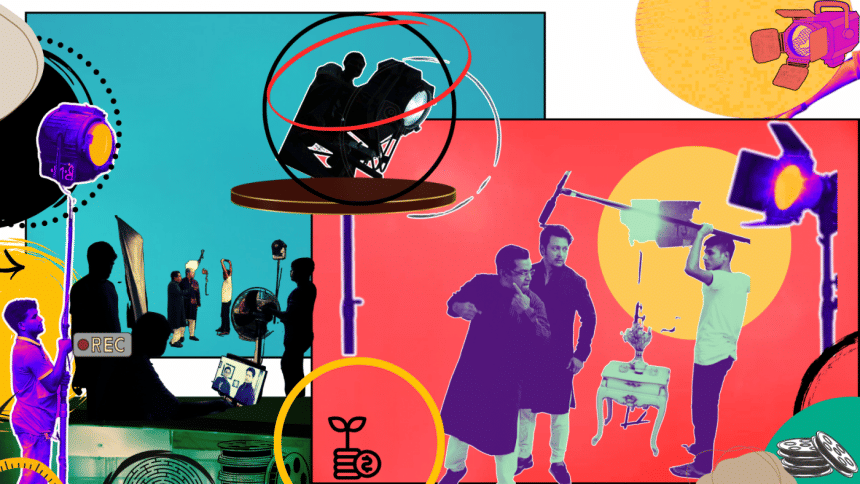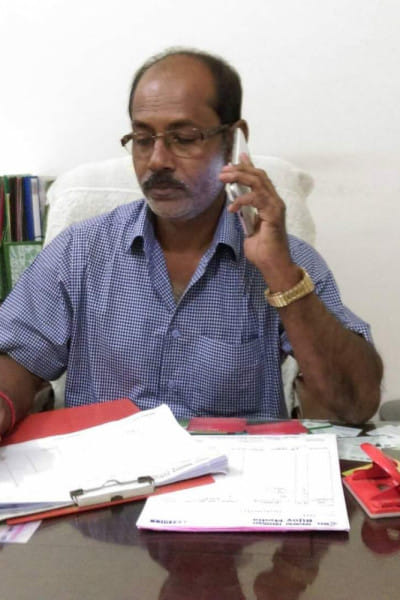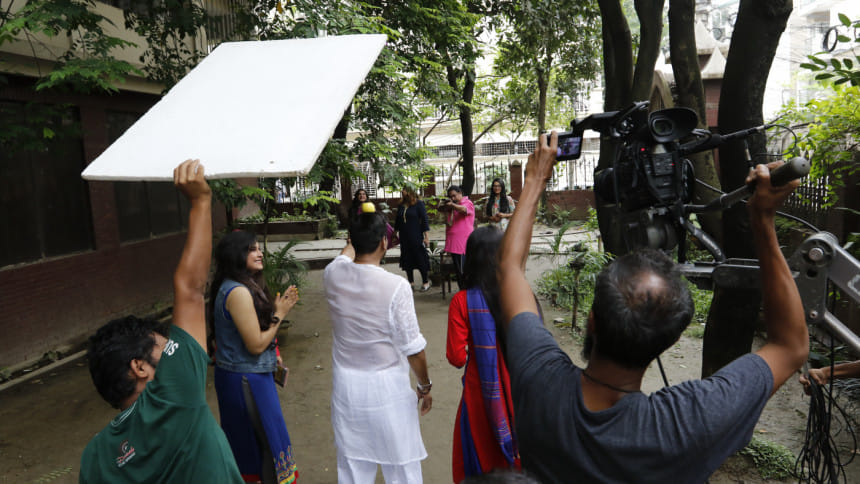Lightmen struggle to light up their own lives in uncertain industry

Lighting plays a crucial role in filmmaking. It sets the mood, directs the viewer's attention, and enhances the narrative. Imagine a movie illuminated only with flat, white light—like the sterile environment of a hospital. It lacks ambience, mood, and emotional guidance for the audience. Behind this essential aspect of filmmaking are the lighting technicians, whose efforts often go unnoticed. In Bangladesh, however, these technicians face an uncertain future, as the industry battles deep financial challenges.

Bimol Das, the owner of Bijoy Media and a veteran in the field, paints a grim picture of the current state of the lighting sector. "One of the most neglected and affected sectors in Bangladesh is the media industry," he states. "Our job is very much dependent on the production, and if there is no project, we have no work." For those in the lighting sector, their livelihood is tied to daily wages, and with fewer projects to work on, it's a struggle to make ends meet.
Das points out that lighting companies in Bangladesh operate on a shoestring budget, and in the current condition, many are relying on their own funds to survive. "Since there are no investments for any big projects since the July Uprising, most lighting companies are trying to cope with their own resources," he explains. To support their staff during this difficult time, companies like Bijoy Media have resorted to providing meals and other forms of assistance. "We're dividing people into rosters to ensure everyone gets the opportunity to earn a minimum wage and survive," Das adds.

However, the problem runs deeper. The technicians in this sector often come from humble backgrounds with limited educational qualifications, and for many, the passion for the entertainment media drew them into the industry. "They may come to this sector out of passion, but their bread and butter come from this work. They can't just switch to another profession," explains Das. As it takes years of experience to become proficient, losing these technicians would lead to a scarcity of skilled labour. Bimol Das also divulges he had to sell property to keep the businesses afloat, while other companies have sold their equipment or shut down altogether.
Das, who has been working in the industry since 1980, has never witnessed a situation as dire as this. "Since I began, there has not been such a bad situation, not even during the pandemic," he recalls. According to him, work has decreased by 75 percent compared to pre-crisis levels, and if investors don't step in, there seems to be little hope for the future. "We need an elected government to intervene and provide hope, otherwise everything will remain at a standstill," he warns.

M Salam Chaudhary, president of the Shooting Light Owners Association and owner of Alomohol, shares similar concerns. "After Eid-ul-Azha, we have been out of work," Salam says, describing how the industry has been hit hard. "In regular times, each company would supply their best numbers of technicians, up to 100 crew per day to different shooting locations. But now, with fewer projects, there's hardly any work, and not even opportunity for over five to work."
This has left technicians in a dire situation. "Some of the technicians, whom we've invested so much effort into training, are now forced to switch to a different profession. Others have left the city, or sent their families back to the village."
Salam also faces financial strain, as his company must pay Tk 70,000 as rent for office spaces and additionally, there are costs for maintaining godowns even when there is little business. "It's a big challenge for us to survive," he says. With a significant reduction in the scale of their operations, Salam's company now employs only a fraction of its previous workforce. "Our manpower has been reduced by half of what we had earlier, these crew members are leaving and we are not able to keep them, and many have switched professions," he explains.

He also reveals that the income per project has plummeted. "The contract amount which we previously got for Tk 25,000 for each production is now being offered for only Tk 10,000. How do we survive like this?"
He shared that he is now striving with bank loans of nearly Tk 35 lakhs and living in uncertainty, yet hoping for a good time to return. "There are around 23 shooting lighthouses, and in this critical situation only a few of them such as Bijoy Media, or Light House are surviving, the rest have already either closed down or shrunk their business."
The situation is no better for SM Mujibur Rahman, the owner of Light House (since 1998), one of the largest lighting companies in the industry. "We are unable to clear the payments for our staff, but we're still trying to cope," admits Rahman, who has been a part of the industry since 1995. His company, which employs around 70 people, used to generate an income of Tk 30,000 to 35,000 per month. Now, that amount has dropped to Tk 15,000 to Tk 18,000. "We mainly work for TVCs, web series, and films, but the projects have drastically reduced," Rahman says, adding that the workers' wages are insufficient to meet their needs.

Ibrahim Shahriar, the secretary of the Lightman Association, and the owner of SS Media (since 2016), highlights the undervaluation and neglect of technicians in the industry. "The light technicians are the most neglected and discriminated against in the industry," he observes. Having worked in the sector since 1994, Shahriar recalls how the situation has worsened over the past decade. "Technicians are often treated poorly, especially when they go for outdoor shoots. They get non-AC cars, and hotels with poor facilities and are forced to adjust to extreme conditions," says Ibrahim.
Despite their hard work, many technicians receive only small wages—around Tk 1,000 for small screen projects and Tk 1,200 for larger projects. "Even a decade ago, we were respected and valued by the fraternity, but sadly it is deteriorating with each passing day."
Shahriar's frustration is evident when he reflects on how financially unsustainable the job has become. "Our call time is at 5am, and we work for 18-20 hours a day. If these technicians pull a rickshaw for half a day, they would earn the same amount, with more time for rest and family," he points out. Many of his skilled workers have already left the industry in search of alternate options, such as rickshaw pulling or selling vegetables, just to make a living. "From a workforce of 50, I'm now left with just 20 people," he shares.
In his career, he has worked in over 200 films, some of which include "Srabon Megher Din", "Guerilla", "Joyjatra", "Alpha", "Runway", and "Priyotoma", among others.

Mohammad Kholilur Rohman, the owner of Light Gallery (since 2015), faces similar difficulties. "For three months, our office was locked, and we had no work. We had 8-10 shoots per day on our regular days of business, which has now dropped to one or two," Rahman explains. He, too, has seen his workforce shrink drastically, from 50 staff members to just 25. "The people who work in this industry are made through years of hard work, but now, we have nothing left but to wait for a better time," sighs Rahman, who mainly works for small screens.
The lack of consistent work and proper compensation has led to a significant depletion of skilled labour, making it harder for companies to maintain their operations. As these technicians are often the backbone of film productions, this loss is a blow to the industry's future. The combination of financial struggles, undervaluation, and poor working conditions has pushed many talented technicians to the brink. The uncertainty of the situation makes it difficult for lighting companies to envision a way forward.
The challenges faced by the lighting sector in Bangladesh reflect broader issues within the media industry, where workers are often underpaid and overworked. Unless there is significant intervention from investors or the government, many fear that this crucial part of the film and television industry may not survive. For now, all the workers and company owners can do is wait and hope for a change—waiting for the light at the end of the tunnel.

 For all latest news, follow The Daily Star's Google News channel.
For all latest news, follow The Daily Star's Google News channel. 









Comments